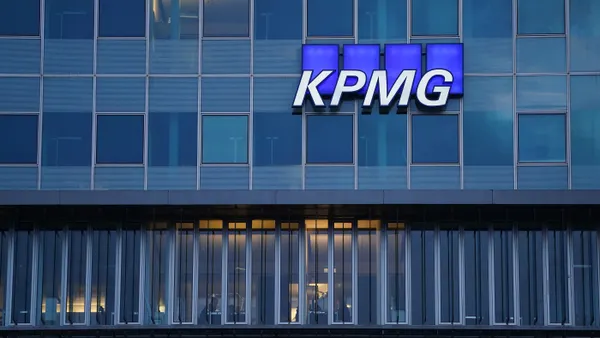As the coronavirus' impact in the U.S. increases, company executives are rushing to get ahead of the damage. CFO.com recently compiled a list of three major strategic risks CFOs must consider and address head-on: company liquidity, supply chain concerns, and company guidance and management, discussion and analysis (MD&A) disclosures.
David Brown, a lawyer at Alston & Bird, LLP, who co-wrote the CFO.com article, told CFO Dive Friday that the CFO, as opposed to any other member of the c-suite, is uniquely suited to quell investor and employee concerns, in two ways.
First, Brown said, "liquidity is an important part of continuing to run a business. Investors want to know that the company has a good financial plan, and will fund their business if there’s a sharp downturn in revenue."
Second, CFOs must ask themselves whether they have a good contingency plan to use cash wisely. "Whether it’s helping suppliers, or additional expenditures to make sure customers stay happy, that can take extra cash," he said.
Keeping cool in California
In the Bay Area of California, 56 confirmed cases have been reported as of March 7. But Mohit Daswani, CFO of analytics platform ThoughtSpot, based in Sunnyvale, remains calm and focused.
Daswani has already seen a fair amount of panic, both on a human level and in the markets, but takes measured response.
"First, we’re stepping back and quantifying the risk," he told CFO Dive Friday. "The speed at which we can quantify risk is key. And then I can go in and help and inform decisions."
Daswani is keeping an eye on the rate of exposure, which he’ll quantify and then share with his team so he "can guide the company on how to manage it and deal with it."
"Some risks you can manage, some hit you and you absorb, and to some, you adjust," he said.
First priorities
The same goes for cash flow, which, along with receivables, Daswani studies closely. "Do we have companies at risk with our customers? How are we going to work with them? Do we need to manage differently?"
Daswani hammers home that the speed with which he quantifies risk is key. "Do it quickly so we’re not panicking ... quantify it so it’s finite and has parameters.
“Bringing that clarity is the first and foremost thing I’ll look to do as CFO,” he said.
Collaboration is also key, Brown said. CFOs would do best to partner strategically with the heads of marketing and HR to maintain order and financial stability. Brown urges CFOs to collaborate, first, with the heads of HR, stressing the importance of having a clear line of communication between the c-suite and employees.
"Together, put a plan in place, not only for companies, but for individual facilities and things like travel policies," Brown said, recommending that fallout plans be finalized before pulling out of a large conference, for instance. "I think it’s very important that the CFO and chief human resources officer understand those potential costs."
"This is really an all hands on deck type of exercise," he said. "The individual departments are not siloed, but they’re making these decisions with respect to how they impacts the others."
Risk management remains a constant function
Daswani knows that there is always risk in business, and his philosophy for managing the coronavirus outbreak is that if you can put it into context, it will pass.
"We’ve had SARS and other global pandemics that have come along," he recalled. "There’s a human toll, which is scary, but it will pass. And when it recedes, we will see our way through, absorb the impact, and move forward."
Daswani maintains that at this point, coronavirus is "not a calamity." Forging ahead, there are really two things on his plate. First — what can he do to be as aware of the risks as possible? In his view, open communication is key. And secondly — smart decision-making. What’s going to change as a result?
Daswani asks, "If this became prolonged, how would it translate to our results? And then, here’s what we can do as a response." After that, he said, just do the best you can to navigate through it.
"Events like this are unknowns," he acknowledged. "But with 10 years of a bull market, an economic slowdown is not the end of the world.
"It’s no different than the role the CFO should be playing in any company — risk management and always watching for the downside,” he said. “And have your plan in place for if there’s a downturn."














